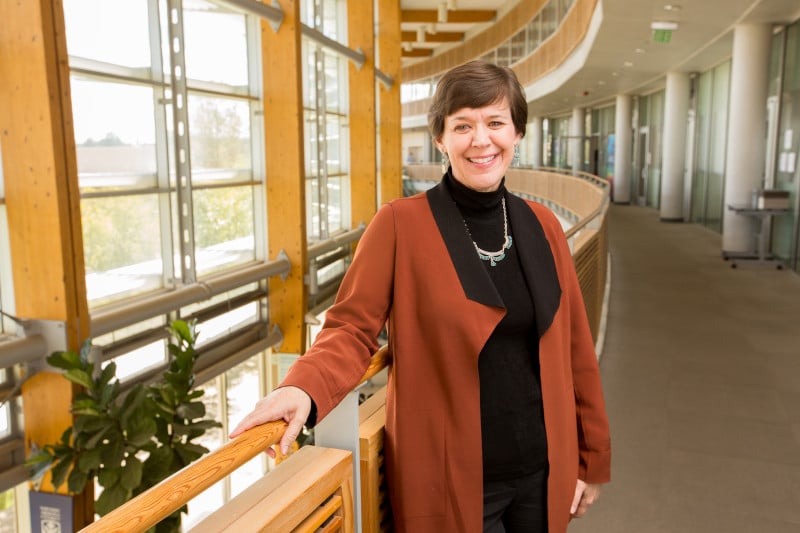Researchers in Northern Arizona University’s Center for Health Equity Research (CHER) and the Southwest Health Equity Research Collaborative (SHERC) recently received four grants totaling more than $1 million from the National Institutes of Health (NIH) for projects related to the COVID-19 pandemic.
NAU Regents’ Professor Julie Baldwin, director of CHER and the principal investigator for three of these projects, said the purpose of the grants is to address health inequities that have become even more evident due to COVID-19 for underserved communities throughout Arizona.
“We feel so fortunate to have received this funding from NIH, and we are committed to working with communities that have been hit the hardest by this pandemic,” Baldwin said. “Tackling this disease requires interdisciplinary, multi-sector and culturally centered efforts that recognize the multiple levels of impact and the need for community-driven solutions.”
Through the four grants, CHER researchers are collaborating across eight NAU departments and are partnering with multiple communities in Arizona.
Understanding resilience and mental well-being: Southwest Indigenous Nations and the impact of COVID-19
The purpose of this one-year, $370,000 project is for NAU researchers to demonstrate the resilience of Indigenous communities and nations in Arizona and to identify Indigenous determinants of health used during the COVID-19 pandemic.
“Indigenous nations have suffered disproportionate health, economic, mental wellbeing and cultural impacts from COVID-19,” said Karen Jarratt-Snider, chair and associate professor in NAU’s Department of Applied Indigenous Studies. “This research, in partnership with Indigenous nations, will examine the factors that contribute to the resilience of Native peoples under the exceptionally difficult conditions resulting from this pandemic.”
In addition to Jarratt-Snider, NAU co-investigators on the project are:
- Manley Begay, professor in the Department of Applied Indigenous Studies
- Darold Joseph, assistant professor in NAU’s Department of Educational Specialties
- Alisse Ali-Joseph, assistant professor in the Department of Applied Indigenous Studies
- Juliette Roddy, The NARBHA Institute James Wurgler MD Chair of Criminal Justice and Behavioral Health in NAU’s Department of Criminology and Criminal Justice
- Marianne Nielsen, professor in the Department of Criminology and Criminal Justice
- Angelina Castagno, director of the Diné Institute for Navajo Nation Educators and professor, Department of Educational Leadership
- Nicolette Teufel-Shone, professor in NAU’s Department of Health Sciences and associate director of CHER
- Chesleigh Keene, assistant professor in NAU’s Department of Educational Psychology
- Amanda Hunter, postdoctoral scholar with CHER
- CHER project coordinators Carol Goldtooth Begay and Kelly McCue
Rapid assessment of immediate and potential long-term implications of changing telehealth regulations for substance use treatment in the context of COVID-19
The goals of this one-year, $293,000 project are to use rapid assessment, response and evaluation (RARE) methods to document online care delivery program barriers and facilitators as well as to provide local communities with information about local equity, acceptability and feasibility of potential telehealth and mHealth interventions during and after the COVID-19 pandemic.
“There is a national discussion about whether to make the guideline changes for medication-assisted treatment (MAT) implemented during COVID-19 permanent,” said Emery Eaves, assistant professor in NAU’s Department of Anthropology. “Our project is very important because it will enable us to study how the guideline changes have actually been experienced by people in treatment and treatment providers.”
NAU co-investigators include Eaves, Eck Doerry, professor in NAU’s School of Informatics, Computing, and Cyber Systems (SICCS) and Regents’ Professor Robert Trotter in the Department of Anthropology.
Building trust and awareness to increase Arizona Native nation participation in COVID-19 vaccine trials
Arizona has the third-largest population of people who are American Indian and Alaska Native in the U.S. and is home to 22 federally recognized sovereign Native nations. People who are American Indian and Alaska Native represent approximately 4.6 percent of the state’s population, yet they account for 19 percent of COVID-19 deaths.
This $200,000, one-year project is designed to establish effective, culturally appropriate strategies to enhance participation of American Indian and Alaska Native communities in the prevention and treatment of COVID-19, including vaccine trials and future vaccine uptake.
NAU co-investigators include Samantha Sabo, associate professor of Health Sciences and CHER, Teufel-Shone and Naomi Lee, assistant professor in NAU’s Department of Chemistry and Biochemistry.
Arizona Community Engagement Alliance (CEAL) COVID Consortium: Promoting health equity during the COVID pandemic
NAU researchers involved in this yearlong, $250,000 project will conduct community-engaged research and outreach to increase COVID-19 awareness and education among communities disproportionately affected by COVID-19 to reduce misinformation and mistrust.
The subaward is part of a one-year, $1 million project to engage members of Arizona’s Latino, American Indian and African American communities to gain a deeper understanding of community members’ experiences, concerns and attitudes regarding COVID-19 testing, prevention, clinical trial participation, vaccination uptake and medical mistrust.
“Now is the time to leverage everything NAU, ASU, UA and the Mayo Clinic can bring to learn from Arizona community members who have been highly impacted by COVID-19 and change the course of COVID-19 in Arizona,” said Sabo, who is the multiple principal investigator of the award.
NAU co-investigators are Baldwin, Teufel-Shone, Lee, assistant professors Linnea Evans and Amanda Pollitt in the Department of Health Sciences and CHER, Heather Williamson, assistant professor in the Department of Occupational Therapy and CHER and Joseph Mihaljevic, assistant professor of SICCS.
In addition to these four grants, CHER was awarded $75,000 by the Flinn Foundation earlier this year for a project focusing on epidemiological modeling for COVID-19.
SHERC is funded by the National Institute on Minority Health and Health Disparities, U54MD012388.



